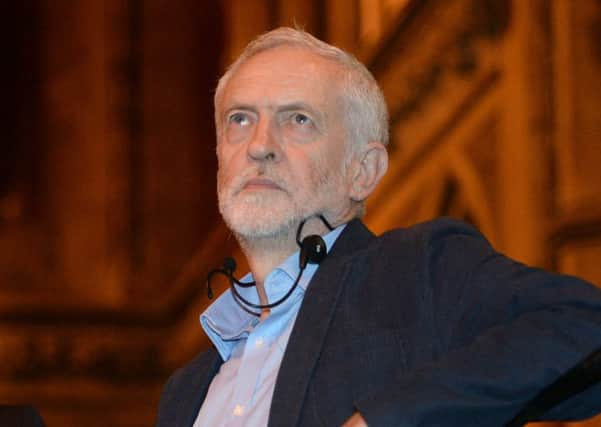Euan McColm: Moving the deckchairs on the good ship Corbyn


In his speech to conference, and in interviews that followed it, he spoke of his belief that Labour’s warring factions would cease hostilities and come together. There was a Tory government to be held to account and that imperative would trump all.
This was, of course, nonsense. There was never any chance of the parliamentary Labour Party agreeing a ceasefire. The centrists who believe Corbyn and his cronies are dragging their party to oblivion could hardly, after all, credibly come back into the fold after publicly declaring their contempt for the leader.
Advertisement
Hide AdAdvertisement
Hide AdBut even if those moderates – the Liz Kendalls and Chuka Umunnas and the Dan Jarvises – had been willing to join the Labour front bench, Corbyn wouldn’t have wanted them there. His is a project of retro-socialist purity and those who consider it prudent to try to appeal to the broadest spectrum of voters are not to be trusted.
We saw just how hollow Corbyn’s words about unity were last week when he announced his reshuffle. Yes, some who had walked during the summer returned, but they are obscure figures who are unlikely to have the Tories atremble with fear.
More significant were the senior appointments Corbyn made. The deeply divisive Diane Abbott – and I utterly reject the suggestion made by Corbynistas that to criticise this arrogant, patronising, intellectually incoherent politician is racist – became shadow home secretary, while Shami Chakrabarti, ennobled after producing a much-criticised report into Labour’s anti-Semitism problem, was handed the position of shadow attorney general.
Corbyn loyalists John McDonnell and Emily Thornberry remain, respectively, shadow chancellor and shadow foreign secretary.
And Corbyn sacked long-serving chief whip, Dame Rosie Winterton, replacing her with Nick Brown. Dame Rosie is admired by parliamentary colleagues who saw her as a defender of their interests against the leader’s office and her dismissal was seen – rightly – by some MPs as a sign that Corbyn is not interested in reaching out to those who have estranged themselves from him.
The reshuffle means that Corbyn has placed in the most powerful positions on the front bench a group of people whose blind loyalty is beyond question. These are lickspittles who wouldn’t dare question the leader’s strategy (if and when one becomes apparent) and who will cheer his every wrong move.
When polls – as they will – continue to show that Corbyn has no chance of becoming the next prime minister, these colleagues will argue black is white. It will never occur to them to suggest a new approach. They have drunk deeply of the Kool-Aid and they will go down with the good ship Corbyn, all the time demanding that we see victory is within their grasp.
Sitting Labour MPs who do not buy into the nonsense that Corbyn can win an election might want to dust down their CVs. The leader’s failure to reach out during the reshuffle will be echoed in the actions of his supporters in constituencies across the country.
Advertisement
Hide AdAdvertisement
Hide AdMPs who are seen as disloyal have already been told by key Corbyn allies – such as the former journalist turned middle-aged hipster revolutionary Paul Mason – that they are on borrowed time. Mason, bleakly hilarious though the notion may be, speaks for those who outnumber moderates in the Labour Party. And those who share his views will surely move against those MPs who are dangerously centrist.
There can be no second attempt by moderate Labour MPs to remove Corbyn. He would fight and he would win again. Of that there is no doubt.
The best possible hope those who see his weakness as a leader have is that Prime Minster Theresa May calls an early general election. The thrashing of Labour by a Tory Party more right wing than it has been in a decade might, at a push, nudge some Corbynistas into reality. Maybe then they would see the wisdom in electing a leader who’s interested in doing more than chirruping banal virtue-signalling slogans to the faithful.
But just as likely is that a Corbyn ally – the loathsome McDonnell, whose past support for the IRA is recklessly ignored by Labour members – would take over and Labour’s current poll ratings would be seen as the stuff of salad days.
In victory, Corbyn has exacted revenge on those who dared to question him. The Labour front bench is now weaker than it has been at any point in living memory.
The Labour MP John Woodcock, who has been vocal in his criticism of Corbyn, tweeted on Friday that talk of the leader wiping the slate clean was “absurd” when he had not asked the party’s sole Scottish MP Ian Murray to return to the position of shadow Scottish secretary.
Murray – whose retention of his seat last year in the midst of an SNP landslide speaks of his abilities as a campaigner – is precisely the sort of credible figure Corbyn desperately needs if he is to stand a chance of halting the party’s slide in the polls (let’s not even pretend there is anything Corbyn could do to win a general election. May could spend the next election campaign stamping on Labrador puppies in supermarket car parks and still the Tories would cruise to victory).
There are almost four years until the next scheduled general election and the Prime Minister should bide her time. There is simply no need for her to call an early election to consolidate her position while the Labour Party continues to indulge Corbyn.
Advertisement
Hide AdAdvertisement
Hide AdThe Tory leader should let Labour continue to self-harm, beat them in 2020, and then watch them fall further under McDonnell or another ideologically “pure” hopeless case.
Reshuffles tell us much about the priorities of political leaders. Jeremy Corbyn’s tells us that his priority is the protection – at any cost – of Jeremy Corbyn.